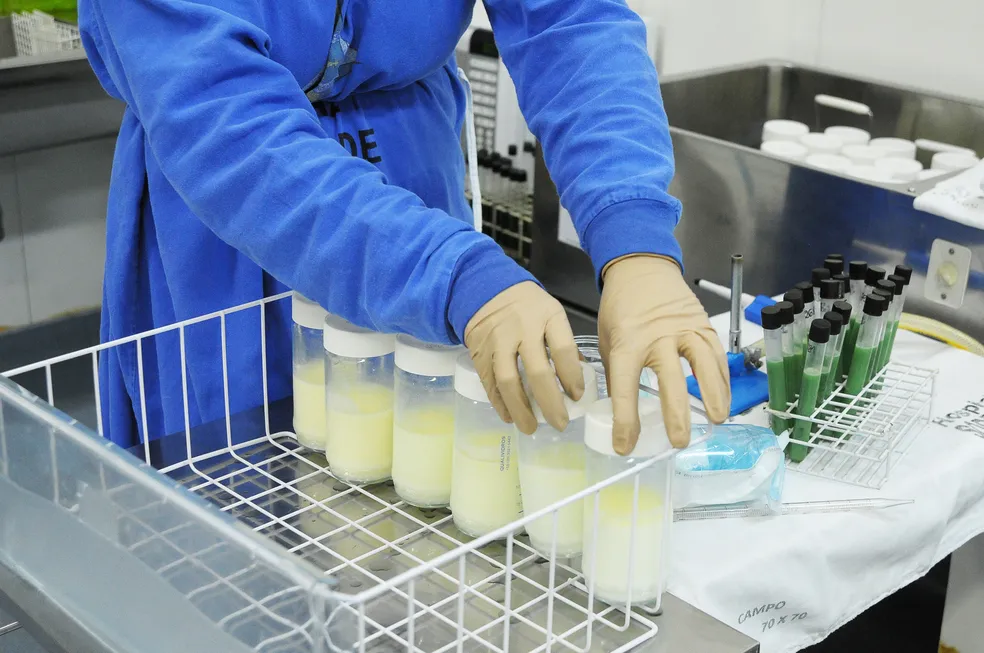Each year, 340,000 Brazilian babies are born prematurely or with low birth weight, according to an estimate from the Ministry of Health. The number corresponds to 12% of the total number of live births. They are the main beneficiaries of the donation of human milk, which is essential for the health of babies during the period in which they are in neonatal Intensive Care Units (ICUs) and cannot be breastfed by their mother.
Data from the Ministry of Health indicate that, between January and December 2023, 253 thousand liters of human milk were donated in Brazil, benefiting more than 225 thousand newborns. The number is 8% higher than the previous year, but still represents only 55% of the country's needs. In Rio Grande do Norte, 5.7 thousand liters of human milk were donated, which reached 8.5 thousand newborns in neonatal units in the state.
National Human Milk Donation Day, celebrated on May 19, is an initiative to promote breastfeeding, encourage donations, promote debates, clarify doubts and publicize milk banks capable of receiving and forwarding donations to families in need. This year, the date closes the national week in reference to the theme, strengthened by international cooperation through the recognition of Mercosur and Unasur.
Caroline, a mother treated at the Santos Dumont Institute (ISD), had a premature birth and knows the importance of the gesture of solidarity. “I donated it to a mother of twins, a couple who were in the ICU. She was unable to express any milk or give it to the baby, so the doctor at the hospital spoke to me and I agreed,” he said.
ISD's pediatric preceptor, Stella Beatriz, explains that, in prematurity, babies do not have the strength to draw and swallow breast milk. “This lack of coordination between sucking and swallowing means that they cannot acquire milk on their own when breastfeeding, we need to give it through tubes, and that is what will keep the baby well fed.”
Johnatan, Carol's son, was born at seven months old, with microcephaly. The mother had difficulties, but was guided and managed to ensure the baby was breastfed. “It was very difficult for him to want to take the breast, but I was able to take it and give it to the cup. I stayed with him in the hospital for a month until he learned to breastfeed and carry weight”, he reported.
The ISD multidisciplinary team monitors the growth and development of the boy, who is now one year and two months old. Stella warns that ensuring quality prenatal care, with constant follow-up and monitoring, significantly reduces the risk of prematurity. When it is not possible to avoid it, labor occurs closer to the correct period of birth.
Human milk guarantees protection for babies
Human milk has unique properties that provide these babies with greater chances of recovery and a healthier life. The Ministry of Health estimates that breastfeeding is capable of reducing the death of children under 5 years of age worldwide from preventable causes by up to 13%, reducing the occurrence of diarrhea, perinatal conditions and infections, the main causes of death in newborns. born.
“The advantage in relation to artificial breastfeeding is that it has biological protectors that improve the baby's immunity and promote weight gain, due to the proteins that are present. In the long term, children who receive exclusive breastfeeding for up to six months, supplementable for up to two years or more, are less likely to have hypertension, diabetes and obesity”, explains the ISD specialist.
In addition to the benefits for premature babies, the donation of human milk seeks to meet other needs in neonatal care, such as in the case of babies of mothers who have difficulty breastfeeding, or those who, for various reasons, have lost the bond with their mother. When the newborn loses access to breastfeeding, he needs to be fed using infant formula, which puts a burden on the SUS and does not offer the same effectiveness.
Care that must be observed when donating human milk:
- Use a glass jar with a plastic lid
- Boil the bottle beforehand or use one provided by the collection point;
- Use a cap or scarf over your hair during collection;
- Clean your hands with soap and water and your breasts with just water;
- The bottle should not be completely full (leave two fingers from the edge);
- Identify the bottle with your full name, delivery date and collection date;
- Store the bottle covered in the freezer until delivery.
Find out where to drop off your milk for donation:
Human Milk Banks in Rio Grande do Norte:
- Januário Cicco Maternity School (Natal) – (84) 3342-5800
- Hospital Drº José Pedro Bezerra (Natal) – (84) 3232-7728
- Coronel Pedro Germano Central Hospital (Natal) – (84) 3232-0941
- Divino Amor Maternity Hospital (Parnamirim) – (84) 3272-4367
- Seridó Hospital (Caicó) – (84) 98192-2300
- Hospital Regional Midwife Maria Correia (Mossoró) – 84 3317-3050
Human Milk Collection Stations in Rio Grande do Norte:
- Leide Morais Maternity Hospital (Christmas) – (84) 3232-1548
- Araken Irerê Pinto Maternity Hospital (Christmas) – (84) 3232-8431
- Ana Bezerra University Hospital (Santa Cruz) – (84) 4042-1100
- Almeida Castro Maternity Hospital (Mossoró) – (84) 3315-1030













